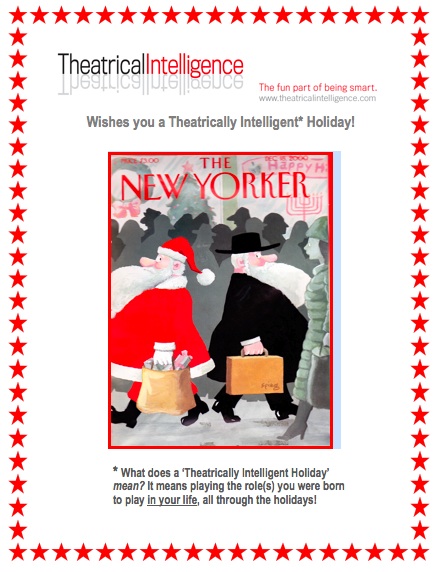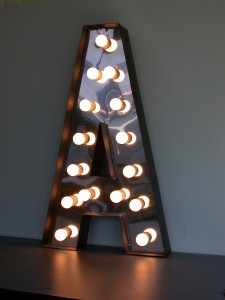Two earlier versions of this post were published in 2010 and 2012. Several colleagues asked me to re-post it, so here it is.
When I work with individuals or groups on ways Theatrical Intelligence can make a difference in their lives, my goal is to stimulate an exploration into their creative core.
The term Theatrical Intelligence evokes responses such as: “Yes! It’ll help me when I have to give a presentation” to “Not my kind of thing – don’t like being in the spotlight” or “No way. Acting? Yuck!” There is an assumption that Theatrical Intelligence = Actor.
In a theatrical production model, the Actor is what we see, but only 1/8 of what is there. She/he wouldn’t be on the stage if it weren’t for the Writer, Producer, Director, Designer, Manager, Technician and Critic. The talent and skill contained in each of these roles is interdependent, and without them, the Actor wouldn’t be seen at all!
What’s Really There
Creative collaboration requires that each person within a group takes on his/her most comfortable role, and everyone contributes to the creative potential of the collective. It is built on the premise that all collaborators’ talents and skills complement one another. In other words if I don’t have a particular strength, one of my cohorts will.
Recently I worked with a young woman who told me “I don’t have one creative bone in my body. It’s just the way I’ve always been and I’m fine with it.” She was politely annoyed that I didn’t accept her “non-creativity”. What became abundantly clear during a quick writing exercise, is that she was a born technician (the only one who could get the electronic hook-up to work); and a gifted manager (she organised a group photo while keeping large egos satisfied, and everyone ended up grateful that she was there).
When I pointed out her strengths in those roles, she explained “But that’s the easy stuff!” which gave us our biggest laugh of the day. Everyone admitted their techno-ignorance, impatience with managing differing personalities; the combination of her geeky-gift and people-management-savvy was something they longed for in their employees.
The talented young Technician/Manager took all this in, and with just the hint of a grin, said: “Well, maybe I have a couple of creative bones…”
Understanding her Theatrical Intelligence that day, she fully experienced “the fun part of being smart”. Yes, it was easy. And the smartness was all her own.
What’s “the easy stuff” for you? How much do you use it every day? Are you giving it the respect it deserves?






Recent Blog Comments